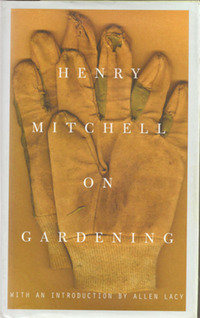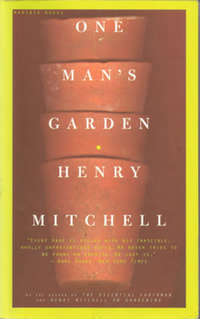





Scores of gardening books line my office shelves. Many of them just sit there on a high shelf, seldom used and almost forgotten. However, they make my collection look impressive, so I keep them. Some, though, are dog-eared and have lost their coffee-table allure from having been handled, stacked, dropped, or stumbled over after my desk became so crowded that I put them on the floor.
It is these that I consult frequently when I'm in a writing mode. They are the authorities I rely on for sound gardening advice. When not piled on my desk or blocking my way to it, they are on a handy shelf near the middle of the bookcase. These books are the research tools of my trade.
Who, for instance, could write an article about a woody plant without consulting Michael Dirr? Who knows more about Florida's native plants than the likes of Gil Nelson and Rufino Osorio? What Southern garden writer dares to write about bulbs without Scott Ogden nearby, and who can manage an herb garden without the sage advice of Madalene Hill and Gwen Barclay? What would my perennial border be without Bill Welch and Allan Armitage? Ken Druse and Charlotte Seidenberg, along with Sally and Andy Wasowski, have helped me learn about native plants and natural gardening. Bob Black, Ed Gilman, Felder Rushing, and Norman Winter are frequently consulted experts.
 Collecting gardening books has always been a passion of mine. One day, while browsing the gardening section of a bookstore, I happened on one of Henry Mitchell's books. The book was The Essential Earthman. I nearly put it back on the shelf because there were no colored pictures of flowers or gardens, and I could see nothing outstanding about the book by flipping through the pages. However, I stood there and read a few paragraphs. From that moment on, I was an ardent admirer. I took the book home, read it from cover to cover, and knew that I would have to have all of his gardening books.
Collecting gardening books has always been a passion of mine. One day, while browsing the gardening section of a bookstore, I happened on one of Henry Mitchell's books. The book was The Essential Earthman. I nearly put it back on the shelf because there were no colored pictures of flowers or gardens, and I could see nothing outstanding about the book by flipping through the pages. However, I stood there and read a few paragraphs. From that moment on, I was an ardent admirer. I took the book home, read it from cover to cover, and knew that I would have to have all of his gardening books.
This is the passage that I read at the bookstore that caused me to bring the book home with me. "There are no green thumbs or black thumbs. There are only gardeners and non-gardeners. Gardeners are the ones who ruin after ruin get on with the high defiance of nature herself, creating, in the very face of her chaos and tornado, the bower of roses and the pride of irises. It sounds very well to garden a "natural way." You may see the natural way in any desert, any swamp, any leech-filled laurel hell. Defiance, on the other hand, is what makes gardeners."
I knew that, and had experienced the defiance that is required to bring a garden into being and keep it looking decent over the long haul. I understood Henry Mitchell, and he understood me. He knew that a perfect garden was unattainable, but still worth striving for. He knew that every gardener suffers setbacks and disappointments. "Wherever humans garden magnificently, there are magnificent heartbreaks," he says. It is a sentiment with which all gardeners can identify.
Henry Mitchell was a columnist for the Washington Post for almost 25 years. In his column "Earthman," he wrote of his own garden and his interactions with it. The best of these columns were adapted for his books, One Man's Garden, Henry Mitchell on Gardening, and The Essential Earthman. During his stint at the Post, he also wrote columns under the title "Any Day." He died in 1993, and his wife, Virginia, continues to care for his garden.
Mitchell is opinionated about gardens and gardeners, and he makes no bones about his likes and dislikes. While I do not agree with everything he says, I enjoy reading about his successes and failures. I find myself chuckling out loud and sharing favorite passages with Amiable Spouse. Few writers can match his turn of the phrase that so accurately reveals the mind of a gardener. Some of my favorite quotes are in the frame below. If you enjoy them, chances are that his books will soon be a part of your library.
It is not important for the garden to be beautiful. It is extremely important for the gardener to think it is a fair substitute for Eden.
March is a chancy time in the garden, with temperatures from severe freezing to summer heat, but of course to go from winter to summer you have to pass March.
Mind you, I may lack the connoisseur's palate, but it may be that with tomatoes (as with almost everything else in America) there is a good bit of blathering nonsense and propaganda going on, and relatively little experienced and impartial judgment.
If tender folk go to pieces for fear a plant may be hurt (even before it is hurt, and it usually isn't), then how do they cope with the death of a dog or a person? We are not born to a guarantee of a voluptuous bonbon-type life, you know.
You do, even in paradise, have to come in from the rain, and of course from high glory as well, and scrub the dog's food bowl and get back to the office. Lofty is not everything. It's not even anything if it's just pretend.
What the right flower can do, with luck, is heal the gardener, making him fit (more or less) to love, by steps however slow. Growing old, still in awe, still sitting at her feet.
With tender new leaves and flowers all about, it is easy for the gardener to think he has done well. Payday will come in summer when all defects shall be revealed. This is Scarlett O'Hara time in the garden. Tomorrow is another day.
Gardening is a long road, with many detours and way stations, and here we all are at one point or another. It's not a question of superior or inferior taste, merely a question of which detour we are on at the moment. Getting there (as they say) is not important; the wandering about in the wilderness or in the olive groves or the bayous is the whole point.
I have overlooked a few odds and ends, but the point is that rich colors and fine shapes can be grown in a very small space by anyone. No skill is required, but steadiness is. Watering must be done every day, but it doesn't take long and is a pleasanter responsibility than mortals commonly take on.
Flowers are of course a sexual display unmatched in the living world and anybody who does not respond a little probably has no blood in him.
Compared to gardeners, I think it is generally agreed that others understand very little about anything of consequence.
Copyright © www.100flowers.win Botanic Garden All Rights Reserved